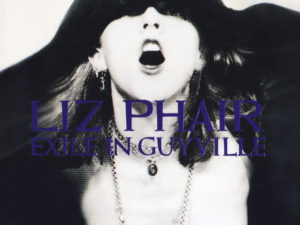By Novid Parsi
Time Out Chicago, June 19-25, 2008
In 1993, an unknown Chicagoan, Liz Phair, released her lo-fi Matador debut, Exile in Guyville, instantly cementing a place in indie-rock history. The albums since haven’t met the same reception; The New York Times called her fourth release, Liz Phair, “career suicide”. But in advance of Phair’s sixth album this fall, Guyville will be reissued on Tuesday 24; the same day, the Winnetka native will perform her first album in a sold-out show at the Vic.
Time Out Chicago: Do you ever feel burdened by your early success with Guyville?
Liz Phair: I used to feel that, and I do feel like so many people have expectations about it that are personal. It’s such an important record in a lot of people’s minds.
TOC: A lot of fans and critics have been disappointed in your work since that album. Do you share that sense of disappointment at all?
Liz Phair: Sometimes, but mostly not. Like, the Liz Phair record I feel very happy with. The last record was a bit of — a couple songs I really like, but a couple I don’t. I let people like what they like and don’t like what they don’t like.
TOC: Some say, “Phair had something with Guyville and then she let it go.” What do you do with that?
Liz Phair: It’s in the past; there’s not much you can do. I really enjoy making music, I love creating, and so I just keep going ahead making the best stuff I can.
TOC: What about the criticism that what made you musically distinctive gave way to a desire to make hits?
Liz Phair: Um, gosh, you’re cantankerous. [Laughs] Like, does it really bother you that people hate you? I mean, no really, does it really bother you that people hate you? [Laughs] Like, honestly, I don’t spend a lot of time worrying about this stuff. It doesn’t feel great, it’s not fun, but at the same time, like, am I really gonna go out and fight all those battles?
TOC: Well, my question wasn’t really how do you feel about people hating you. It’s: What do you think about that criticism of your music?
Liz Phair: Of course the style changed, and definitely Guy was special because it was unself-conscious in a way that I can never really be again. Maybe I’m not understanding what you’re asking.
TOC: Your music took a turn to pop —
Liz Phair: Because my life keeps taking turns. Of course it went pop, and now if you heard what I was doing on the next record it’s gone dirty again, kinda grungey and underproduced.
TOC: An overt sexuality has been key to your songs and image. Does having an 11-year-old son change that?
Liz Phair: It can’t now ’cause I’ve already said all the dirty things. [Laughs] It’s gonna be weird if he listens to that. But I am human and he’s gonna have to deal with that at some point. I’m not going to lead my artistic life because of some social mores, you know?
TOC: He hasn’t listened to Guyville yet?
Liz Phair: No, he literally just the other day, it was very cute, he hooked into music for the first time. He saw a commercial for “Viva La Vida”? The Coldplay song? And he loved it. He flipped. He’s never really been that into music. He doesn’t like when I play guitar.
TOC: In the documentary you directed about Guyville, I couldn’t help but notice the huge bong in the scenes with Nash Kato.
Liz Phair: How funny is that? You want to know the truth? And this is hilarious. I never got stoned. Like, it completely looks like I did — and I would’ve — but I was so worried that I was gonna fuck up the cameras that that whole documentary was shot sober.
TOC: It just happened to be on his table?
Liz Phair: We were in someone else’s apartment. And I’m like, “Oh my God, there’s a huge bong here.” And he’s like, “Really? Bring it out.”
TOC: Do you still smoke weed?
Liz Phair: I rarely, rarely do, but it’s not that I would not if the right circumstance presented itself.
TOC: What’s the right circumstance?
Liz Phair: Probably when I don’t have any work to do and my son’s at his dad’s — or maybe a Dave Matthews show.
TOC: You know, when I told a friend I was doing this interview he said, “Ask her why she sold out.”
Liz Phair: [Laughs] Ask him why he’s a walking cliché. I don’t think “sold out” is even, like, in my book of lingo. Like, I don’t even think that word reflects reality in our society today. It seems, like, very seven years ago.
TOC: You must know that people ask that about you.
Liz Phair: “Sell out” implies there’s a definitive line between what you should do and shouldn’t do. I find that very limited.






